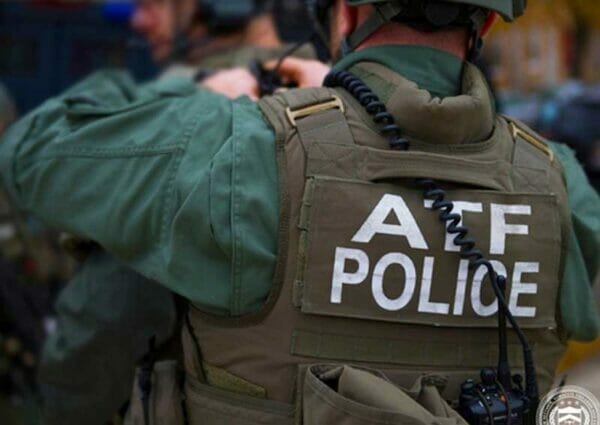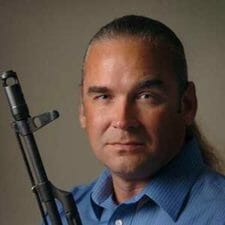
Russell Fincher is a high school history teacher, a Baptist pastor, and a part-time gun dealer. He also coaches Little League in his hometown of Tuskahoma, Oklahoma, which has a population of around 151 souls.
Fincher, 52, has had a Federal Firearm License for three years. He has no brick-and-mortar gun shop. He’s what used to be called a “kitchen table FFL.” He sells most firearms at gun shows, including Wanenmacher’s Arms Show in Tulsa.
“Living in Southeast Oklahoma, if you don’t have a gun under $400, people ain’t buying it,” he said Thursday. “Rarely do people come to my house to buy a gun.”
In April, Fincher received a call from the Bureau of Alcohol, Tobacco, Firearms and Explosives. They wanted to do an inspection at his home.
“I told them they were welcome anytime,” Fincher said.
Two ATF inspectors arrived a few days later. They spent three hours in his home. They took pictures of his 4473s with their cell phones, which Fincher has since learned is an illegal, although common practice.
“Honestly, they were way nicer than I expected,” he said. “They said I had some guns that had traces on them, which concerned them. It concerned me too.”
The inspectors returned two weeks later. They had some “concerns” involving Fincher’s penmanship, which they couldn’t read on several forms. They also found he had juxtaposed the model number of a firearm with the weapon’s serial number, which Fincher was attempting to rectify.
On June 16th, 2023, Fincher and his son were packing for a gun show in Tulsa when the phone rang. It was the ATF. They said they wanted to talk to him before he left for the gun show.
“We can come out to your house,” he recalls the agent saying. “I told them sure; I’d be home.”
That is when seven vehicles roared up to his home and disgorged a dozen ATF agents wearing tactical gear, armed with AR-15s.
“It was like the Trump raid. They called me out onto my deck and handcuffed me. My son was there and saw the whole thing. He’s 13 years old,” Fincher said. “They held me on the porch for about an hour. I was surrounded by agents. One by one, they yelled at me about what I was doing. In my mind I decided if they were going to beat me up over every little thing, I’m done. As soon as I said, ‘If you want my FFL, you can have it,’ one of the agents pulled out a piece of paper and said, ‘Well then sign here.’ He had made three copies in case I screwed one up. It was exactly what they wanted. I was shocked.”
As soon as Fincher relinquished his Federal Firearm License, the ATF began loading up his guns, including a Colt Commander, five Glocks, and a mint AK – a Polytech Pre-ban milled under-folder, which is worth thousands of dollars.
“They took more than 50 of my personal guns,” Fincher said. “I asked them why, and they said they were ‘evidence.’ I’d estimate they took $50,000 to $60,000 worth of guns.”

ATF Threats
After ATF’s SWAT team cleared Fincher’s home, they called the agent in charge of the raid – Special Agent Theodore Mongell – and told him it was “safe to come up.”
“You’re done. We have to shut you down,” Fincher recalls Mongell saying. “You tell all your FFL buddies we are coming for them. We are shutting the gun shows down.”
“One agent told me they hate home FFLs,” Fincher said. “He said if I wanted to sell a Browning shotgun to someone at a gun show with no paperwork, that’s no problem, but when I sell a Glock or an AR lower that’s a ‘gangbanger.’ I asked him where it said that in the regs. He said no gangbanger would be shooting people with a $2,000 Benelli. To me, that was one of the dumbest statements he could have made.”
Several agents accused Fincher of making too much money through his gun show sales. He told them at the last show he attended, he only sold $75 worth of ammunition, but spent $1,200 on hotels, tables, gas, and food.
“They said I was basically using my FFL to sell guns personally,” Fincher said. “They said I was going around the system, putting guns on the street that should not be.”
Fincher was told to load the firearms ATF didn’t want into the back of his pickup, which he later took to another FFL. Toward the end of the ordeal, Fincher asked Mongell about his guns they had seized.
“He told me, ‘If you’re willing to forfeit them, we can make a lot of this go away,’” Fincher said. “This sounds to me like a shakedown. They seized my guns as punitive damage. They knew how to get me, by taking all my guns. There was no rhyme nor reason to what they took. Honestly, they took the most expensive and rarest ones.”
ATF Response
The Second Amendment Foundation’s Investigative Journalism Project contacted ATF Special Agent Theodore Mongell on his cellphone Thursday afternoon and asked him why he raided Fincher’s home and seized his guns.
“I can’t answer any questions,” he said. “I’m not supposed to do that, per my agency. Actually, I’m not supposed to talk to anyone until I get approval from my higher ups. I have to verify who you are, take down your info and go through my agency.”
Despite his promises, Mongell never called back.
Takeaways
There does not appear to be any justification for a SWAT team raid or such a massive show of force. After all, Fincher invited the ATF into his home.
After berating him for more than an hour, the agents never even told Fincher if or when he would be charged with a crime. He fears he would lose his teaching job if he’s charged with a felony.
“They have my life in the palm of their hands, and they have very little accountability,” he said. “I’m just trying to make a living and it takes three jobs just to make ends meet. Dealing as little as I have with the ATF, when you ask them a specific question, they’ll tell you it’s a grey area. Well, a grey area can send you to jail. I’m not Hunter Biden. I’m not going to get my weapon charges dropped.”
About Lee Williams
Lee Williams, who is also known as “The Gun Writer,” is the chief editor of the Second Amendment Foundation’s Investigative Journalism Project. Until recently, he was also an editor for a daily newspaper in Florida. Before becoming an editor, Lee was an investigative reporter at newspapers in three states and a U.S. Territory. Before becoming a journalist, he worked as a police officer. Before becoming a cop, Lee served in the Army. He’s earned more than a dozen national journalism awards as a reporter, and three medals of valor as a cop. Lee is an avid tactical shooter.

